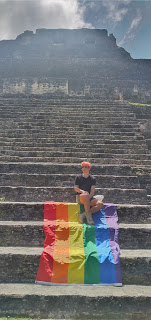Guatemala's Border Dispute: A Belizean LGBT Prospective
Posted August 8th, 2016
Further analysis of this data shows that 65% of all murdered trans and gender diverse people whose profession was known were sex workers...the highest absolute numbers have been found in countries with strong trans movements and civil society organizations that carry out forms of professional monitoring.
“There has been impunity for murders motivated by hatred towards persons identifying as gay, lesbian, transgender, and transsexual.”In approximately 34% of cases of violent crimes against transgender women, the assailants could be identified, but there is little evidence of charges ever being brought.
In Belize, we have documented 32 murders or attempted from 1997 to 2015 that have occurred for various reasons. In all we have received 146 reports of socio-economic and civil rights violations that have gone unanswered.
When crime data is compared to military might, Guatemala has 14,918,999 citizens, 5.518m fit for service, 15,500 active front line personnel, with 340,000 citizens reaching military age annually. It has 20 tanks, 134 armored fighting vehicles, with a defense budget of $210,000,000us.The Belize government spent, $32m us on the military with active personnel at 1,330 with 750 in reserves as of 2016.
When gross domestic product is added in 2015 it stood at $1.76b or less than .1% of the Worlds Economy for Belize, but Guatemala's Gross Domestic Product is $63b. Guatemala's per capita income, $3850us, however, was less than Belize's $7,098.23us in 2015.
What is this thing called the border dispute? It really is about how we value our human rights institutions, like the judiciary, its about whether the rate of poverty will go up or down at the border lines with Guatemala; its about, whether Belize will improve its redress mechanisms with money and personnel tat is accessible to the every day man or woman. We may not have a history of modern genocide, but we do something far worse to our citizens, complicity has attack the dignity of citizens and the practice of collective silence have allowed the perpetuation of mistreatment.
Going to the ICJ or not, we still need to deal with citizens security both economic and personal. The struggle continues.
Guatemala's Stop Trans Murders
https://www.outrightinternational.org/content/guatemala-stop-trans-murders-guatemala
Human Rights Violations of Lesbian, Gay, Bisexual, and Transgender (LGBT) People in Guatemala: A Shadow Report
file:///C:/Users/Caleb/AppData/Local/Temp/566-1.pdf
TMM IDAHOT Release
http://transrespect.org/en/idahot-2016-tmm-update/
Transgender Day of Violence:
http://transrespect.org/en/tdov-2016-tmm-update/
Tansgender Data MAP
http://transrespect.org/wp-content/uploads/2016/03/TvT_TMM_TDoV2016_Tables_EN.pdf
Guatemala Military Strengthen
http://www.globalfirepower.com/country-military-strength-detail.asp?country_id=guatemala
Belize Military
https://en.wikipedia.org/wiki/Belize_Defence_Force
Northern Triangle Violence
http://www.ticotimes.net/2016/01/05/central-americas-violent-northern-triangle-registers-17422-homicides-in-2015
Belize GDP 2015
http://www.tradingeconomics.com/belize/gdp
http://www.tradingeconomics.com/belize/gdp-per-capita-ppp
Guatemala GDP 2015
https://www.gfmag.com/global-data/country-data/guatemala-gdp-country-report
The current debate on Guatemala ad Belize about sovereignty has forced the United Belize Advocacy Movement to look into the level of violence that affects both countries from a LGBT prospective. What the research alludes to is that both countries are challenged to address violence that occurs within its borders, have grossly under-invested in addressing human rights mechanisms, and renders, systematically, its LGBT citizens invisible in policy and planning.
Let's examine the global picture of trans murders. Trans Murder Monitoring project issued its IDAHOT reported that counted 2115 killings of trans and gender diverse
people in 65 countries worldwide between the 1st of January 2008 and the
30th of April 2016. 1,654 of which were reported in Central and South America. The annual report up to December 2015 points out,
Further analysis of this data shows that 65% of all murdered trans and gender diverse people whose profession was known were sex workers...the highest absolute numbers have been found in countries with strong trans movements and civil society organizations that carry out forms of professional monitoring.
The TMM data mapping revealed that it received between 2008-2015 Guatemala had, 39 trans murders, but Belize had 2 documented in that same time period. The 2012 Shadow Report for 104th session of the Human Rights Committee reveals at least 35 LGBT people were murdered in Guatemala between 1996 and
2006 on the basis of their sexual orientation or gender identity, but
between 2009 to 2010, alone, at least 30 transgender individuals were killed.
The Special Rapporteur on extrajudicial, summary or arbitrary executions
noted,
“There has been impunity for murders motivated by hatred towards persons identifying as gay, lesbian, transgender, and transsexual.”In approximately 34% of cases of violent crimes against transgender women, the assailants could be identified, but there is little evidence of charges ever being brought.
In Belize, we have documented 32 murders or attempted from 1997 to 2015 that have occurred for various reasons. In all we have received 146 reports of socio-economic and civil rights violations that have gone unanswered.
The breakdown of data base on human rights violation for Belize between 1997 to 2015 follows a system of under-reporting that invisible violence in our country against persons who are LGBT Belizeans. A result that allows state systems to deny that violence and discriminate occur, including bias-motivated crimes. No state system have these data in Belize except the United Belize Advocacy Movement.
This violence exists both states, Belize has never experience genocide or a 30 year arm conflict. The Guatemalan armed conflict from 1962 to 1996 have not ended violence after loosing an estimated 300,000 people. Even years later, he country 's recorded killings routinely exceed 5,000 per year. In fact, in 2010, 4,925 violent deaths were recorded, including 41 lynchings, as well as 6,132 reports injury as a result of violent attacks. Of the 30,873 reported incidents of violence against women in 2009,
only 0.7% of the cases led to a prosecution and 0.2% to criminal
sentences. Guatemala’s rate for 2015 was little unchanged: 36 homicides per 100,000
people, with 5,718 murders — slightly less than the 38 per 100,000 rate
recorded in 2014. For Belize murders of citizens totaled, 1,553 between 2000-2015 with 672 rapes and 7,541 robberies.
When crime data is compared to military might, Guatemala has 14,918,999 citizens, 5.518m fit for service, 15,500 active front line personnel, with 340,000 citizens reaching military age annually. It has 20 tanks, 134 armored fighting vehicles, with a defense budget of $210,000,000us.The Belize government spent, $32m us on the military with active personnel at 1,330 with 750 in reserves as of 2016.
When gross domestic product is added in 2015 it stood at $1.76b or less than .1% of the Worlds Economy for Belize, but Guatemala's Gross Domestic Product is $63b. Guatemala's per capita income, $3850us, however, was less than Belize's $7,098.23us in 2015.
What is this thing called the border dispute? It really is about how we value our human rights institutions, like the judiciary, its about whether the rate of poverty will go up or down at the border lines with Guatemala; its about, whether Belize will improve its redress mechanisms with money and personnel tat is accessible to the every day man or woman. We may not have a history of modern genocide, but we do something far worse to our citizens, complicity has attack the dignity of citizens and the practice of collective silence have allowed the perpetuation of mistreatment.
Going to the ICJ or not, we still need to deal with citizens security both economic and personal. The struggle continues.
Guatemala's Stop Trans Murders
https://www.outrightinternational.org/content/guatemala-stop-trans-murders-guatemala
Human Rights Violations of Lesbian, Gay, Bisexual, and Transgender (LGBT) People in Guatemala: A Shadow Report
file:///C:/Users/Caleb/AppData/Local/Temp/566-1.pdf
TMM IDAHOT Release
http://transrespect.org/en/idahot-2016-tmm-update/
Transgender Day of Violence:
http://transrespect.org/en/tdov-2016-tmm-update/
Tansgender Data MAP
http://transrespect.org/wp-content/uploads/2016/03/TvT_TMM_TDoV2016_Tables_EN.pdf
Guatemala Military Strengthen
http://www.globalfirepower.com/country-military-strength-detail.asp?country_id=guatemala
Belize Military
https://en.wikipedia.org/wiki/Belize_Defence_Force
Northern Triangle Violence
http://www.ticotimes.net/2016/01/05/central-americas-violent-northern-triangle-registers-17422-homicides-in-2015
Belize GDP 2015
http://www.tradingeconomics.com/belize/gdp
http://www.tradingeconomics.com/belize/gdp-per-capita-ppp
Guatemala GDP 2015
https://www.gfmag.com/global-data/country-data/guatemala-gdp-country-report









Comments
Post a Comment